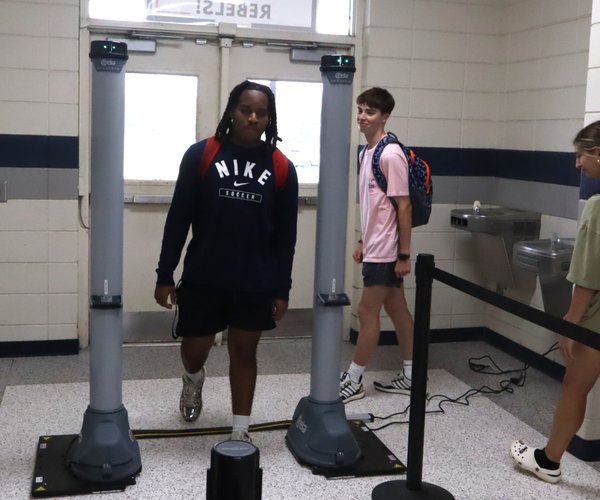Local lawmakers don’t expect the GREAT plan or an increase in the tobacco tax, even as the state stares at continuing dwindling revenues.
State Rep. Buddy Carter (R-Pooler) and state Sen. Jack Hill (R-Reidsville) said the state’s bleak budget picture is as bad as it looks — and may be even worse. Hill, the chairman of the Senate Appropriations Committee, said state revenues are down about 11 percent, and the state budget already has been slashed by nearly 15 percent from the fiscal year 2009.
“We missed our revenue estimates about five times last year,” Hill said. “It’s really been incredible.”
The state derives more than 80 percent of its revenues from income taxes — which account for nearly 50 percent of the total — and sales taxes. Sales tax receipts “hit the wall” in January, Hill said, and local sales taxes were down at a greater rate than the state’s intake.
The state’s revenue through August is off 9.6 percent for fiscal year 2010, compared to the same point in fiscal year 2009. The FY09 budget, originally approved at $21.1 billion, was chopped to $18.9 billion. Gov. Sonny Perdue signed into law an $18.6 billion budget for FY10 in May.
But the state’s revenue prospects have not brightened since. Rather, Hill points out, they have dimmed. And the worst may be yet to come.
“Watch out for 2012,” Carter warned.
Carter said the state has depleted its rainy day fund. He added 2011 “is going to be a difficult year” and “2012 is going to be horrendous.”
“We’ve picked all the low-hanging fruit,” he said. “When we start making budget cuts from this point on, it’s going to hurt. We’ll be cutting bone. I don’t know how it can get worse, but stay tuned. I consider myself to be an optimistic person. But it’s not looking good.”
No clear path for roads
Funding for transportation has taken a sharp turn down too with a drop in fuel taxes. With the drop in gas prices, fuel taxes are down as well and the excise tax — levied by the gallon — is off 7 percent. That could be a result of people driving less or driving more fuel-efficient vehicles, Hill said.
“And those funds go directly to roads and bridges,” he said.
Opposing plans for one-cent sales taxes were pitched by both chambers of the General Assembly, but neither side could agree to pass either the statewide tax or the regional-based tax. What’s currently being floated is a combination of the two proposals — a half-penny tax to be distributed state and another half-penny to be distributed regionally.
“I’m OK with that,” Hill said.
Hill said there are some who don’t believe a statewide tax would pass.
“The regional thing could be important for us,” he said. “Each county would have the right to opt out.”
But whatever plan comes before lawmakers when they reconvene in January, something has to be done soon. Any such plan would have to be an amendment to the state Constitution and if it fails, it would be another two years before it can be resuscitated.
“If it’s going to be on the ballot,” Hill said, “it’s got to happen this year. I would hate to think we put all our eggs in one basket, a statewide tax, and if it fails, we’ve got to wait two more years. We’re in a crunch now where we’ve got to make something happen.”
The House of Representatives-backed statewide tax also included projects that would have been funded with the plan. Through the efforts of Rep. Jon Burns, Carter said, the Effingham Parkway was one of those listed road projects.
But Carter advised that some of the projects may not be part of the half-penny tax.
“I don’t know how we can continue to ignore transportation funding in the state,” he said.
Future of taxes
Speaker of the House Glenn Richardson, who offered his GREAT plan that would have replaced ad valorem taxes with a broad array of sales taxes, likely won’t revive his idea for the coming General Assembly session, Carter said. Also, the House leadership is cool to the idea of raising tobacco taxes to generate more revenue.
Hill called for a reform of the taxes in the state.
“We do have a structural problem with our tax structure in this state,” he said. “Our sales tax structure does not follow the economy. We had growth in the economy and almost no growth in the sales tax. We need to revisit the broadness of our sales tax.”
Funding trauma care
Carter, a proponent of funding the state’s trauma care system, said he still wants to see a dedicated revenue stream for trauma care. Dr. Fred Mullins, medical director of the Joseph M. Still Burn Center at Augusta’s Doctors Hospital, told lawmakers earlier this year that if it had not been for Memorial University Medical Center’s level trauma 1 center, the death toll from the February 2008 Imperial Sugar refinery explosion could have been 10 or 11 more.
“That tells us we need to continue to improve our trauma system,” said Carter, who had a very good friend killed in the explosion that ultimately claimed 14. “We only have 14 level 1 trauma centers.”
Carter said he’s glad the more than $20 million expected from the state’s new superspeeder fine is being ticketed for trauma care. But it’s not reserved specifically for that purpose.
“My concern is that it was not dedicated to trauma care,” he said. “I know how the leadership views dedicated revenue and I also think we need to review dedicated revenue.
“I’m not going to give up until we have dedicated funding sources for trauma.”
Atlanta, state in deep water
Hill and Carter said U.S. District Court Judge Paul Magnuson’s ruling on Georgia’s use of Lake Lanier — located just northeast of Atlanta — could have far-reaching impacts on the entire state.
Judge Magnuson gave Georgia, Alabama and Florida three years to work out an agreement on what has become Atlanta’s primary source for drinking water — even though it wasn’t designed to be that. The lake, built in the 1950s, was designed for flood control, navigation purposes and hydroelectric power.
Under the ruling, metro Atlanta’s withdrawals for drinking water will be curbed to the levels of almost 35 years ago.
“The decision the judge made was based on all that,” Carter said. “But the governor makes a good point in that the purpose of the reservoir has changed. How can you tell the people of Atlanta they have to go back to withdrawal levels of the early 1970s? Even the judge said that would be devastating.”
What that means is more reservoirs for that part of Georgia. How to pay for those is another matter.
“We’re going to have to cut a deal with the other two states and build reservoirs,” Hill said. “Whatever it is we’ve got to do, I’m convinced we’ve got to do it.”
Without water, the ever-expanding Atlanta area could lose potential business prospects. And just because they pass on Atlanta doesn’t mean they’ll look elsewhere in the state to re-locate, Hill and Carter said.
“If we lose that growth in the metro Atlanta area,” Hill said, “it’s going to Birmingham or Charlotte.”
“Atlanta is the economic engine,” Carter said. “Everyone recognizes how important the ports are, but Atlanta is the head. And as the head goes, so goes Georgia.”
Jobs impact plenty
Carter also said that the state’s unemployment rate — now at 10 percent and above the national average for the 21st straight month — will cripple its ability to recover from the economic downturn. The continued loss of jobs will mean lower income taxes and lower sales taxes for the state’s coffers, for one thing.
“Most economists I read say we’ve hit bottom and we’re kind of dragging along the bottom right now,” he said. “Unless that unemployment rate goes down, unless we create those jobs, we’re not going to see an increase in our revenues. It is vitally important we continue to create jobs in the state of Georgia.”
The state has had a better year in bringing in industries and businesses than many other states, Hill said, especially in the current economy. But neither legislator had much to say about any potential prospect for the Pooler megasite. Carter, who was Pooler mayor during the alliance and breakup with Daimler Chrysler, won’t celebrate until he sees activity on the corner of I-16 and I-95.
“I won’t believe it until I see them on the property and see them working,” he said.
The state’s bond resources could be used to fund reservoir construction, but that could cut into building needed at the state’s colleges and universities, Carter said.
“Guess what has happened to the student population since the unemployment rate went up?” he asked. “It’s gone up.”
Hill sounded an upbeat tone on how quickly the Coastal Empire could emerge from the economic doldrums. He related what he’s seen on his travels throughout the state, from the scores of subdivisions with empty homes in the metro Atlanta suburbs to the sparsely populated landscape of southwest Georgia.
In fact, the 2010 Census and the reapportionment to follow could mean the loss of one or two Senate seats in southwest Georgia, Hill said.
“You want to see some tragedy, go to the suburbs of north Atlanta,” he said. “I think our recovery is going to be faster here. People will live near their work if they can, but they will go to work where they have to.
“I wouldn’t swap places with our part of the state or our state for anywhere else. Our future’s bright.”
Carter — who is running for the Senate seat being vacated by gubernatorial candidate Eric Johnson — extended his best wishes for whoever succeeds Perdue in the governor’s mansion after the November 2010 election.
“God bless the next governor,” he said. “I’m not kidding you.”








